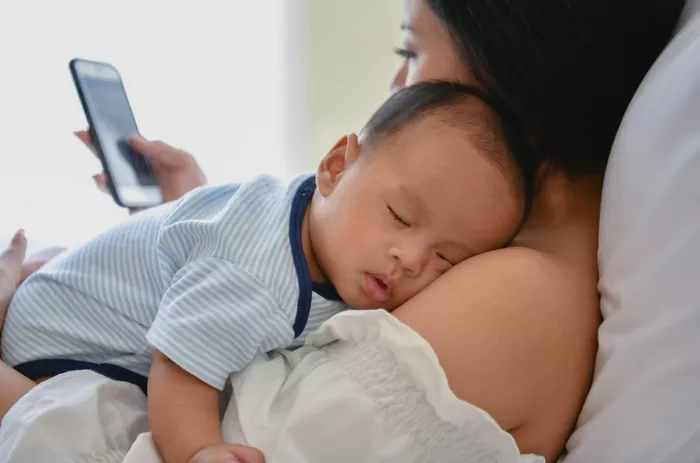Mothers talk less to their infants when using smartphones, a new study reveals.
The research found that moms spoke 16% less to their babies when on their phones. Shorter phone use intervals of 1 to 2 minutes reduced mother-infant interaction even more, decreasing baby talk by 26%.
“Our advice to new parents is to be aware of the impact phones can have on their ability to respond to their child’s needs,” said lead researcher Miriam Mikhelson, a former doctoral student at the University of Texas at Austin. “Consistent and responsive care is critical for infants, which can be challenging with the distracting nature of a smartphone.”
Previous research suggested that parental phone use might affect a child’s language development. However, these studies mostly involved observing parents and children in controlled lab settings.
To understand real-world parent-infant interactions, researchers equipped 16 infants with audio recorders for a week. They then compared these recordings with cell phone logs to see how smartphone use influenced the amount moms talked to their babies.
“We were surprised by the overall quantity of phone use among participants,” said senior researcher Kaya de Barbaro, an assistant professor of psychology at the University of Texas at Austin. “Our sample averaged 4.4 hours of phone use per 12-hour period. While other studies show similar rates, seeing these high numbers was still striking.”
Smartphone use reduced mothers’ verbal interactions with their babies, particularly during short intervals of use. This might be because short-term phone use often involves non-verbal activities like checking email or texting. In contrast, long-term use might include phone or video chats, which could increase the speech a child hears.
The impact of phone use on mother-infant speech was most pronounced at specific times of day: 9 a.m. to 10 a.m., noon to 1 p.m., and 3 p.m. to 4 p.m. These periods coincide with times when moms are typically more engaged with their children, such as during meals or when siblings return from school or daycare.
Parents might underestimate how phone use affects their interactions with infants, the researchers noted.
“Some parents may not be able to turn off or put away their phones due to work or other responsibilities,” Mikhelson said. “For parents who are concerned about the quality of their caregiving, we suggest they try their best to focus on their children and be honest about how much smartphones interfere.”
“Being aware of how easily we become consumed by our phones, despite our best intentions, is an important first step,” Mikhelson added in a journal news release.
Future research should investigate how specific types of phone use affect parent-baby interactions and understand this effect during different activities like meals, playtime, and breastfeeding.


